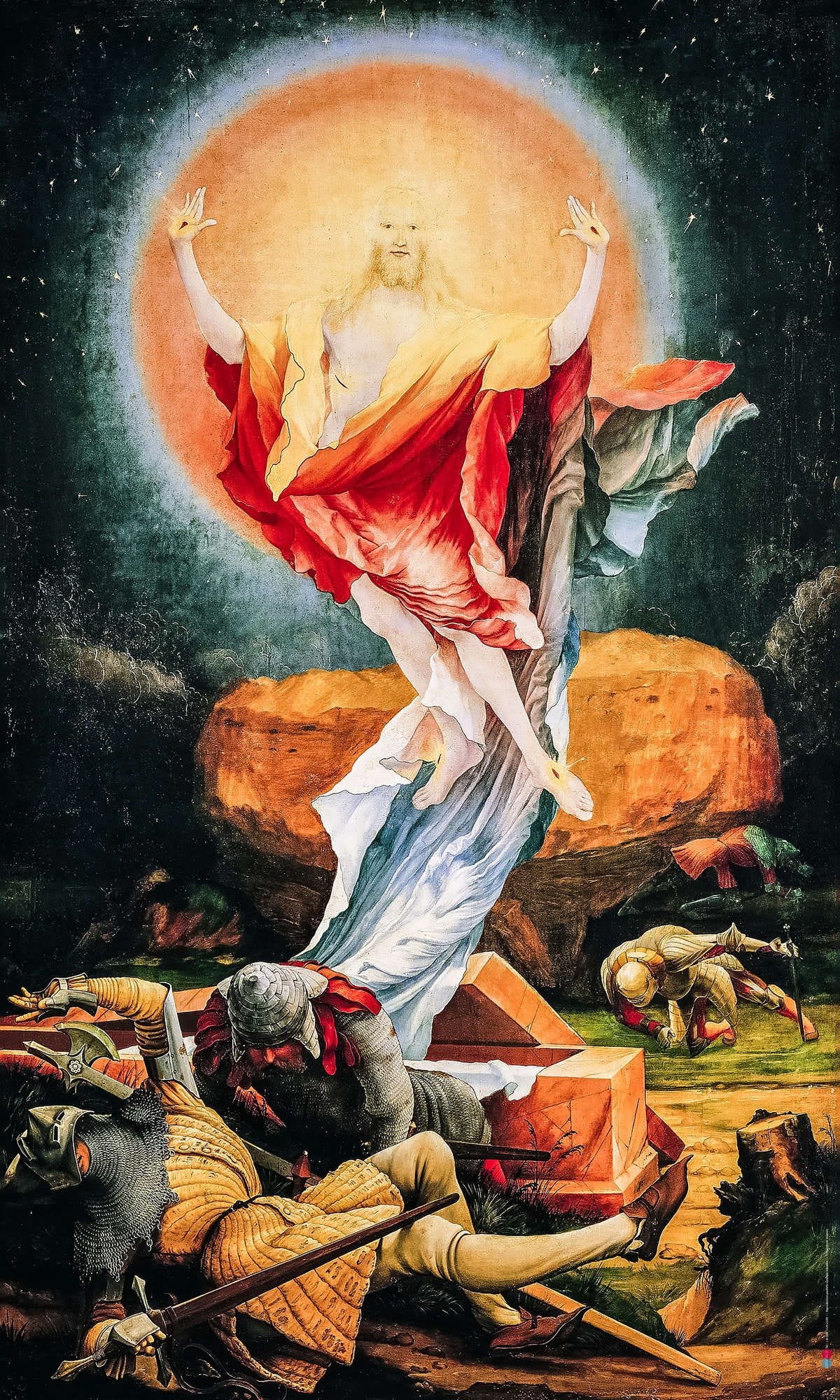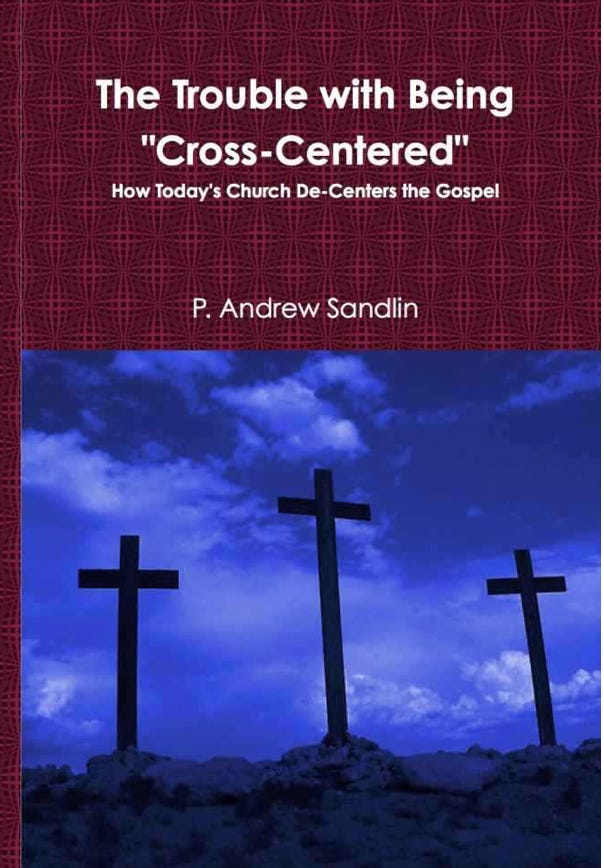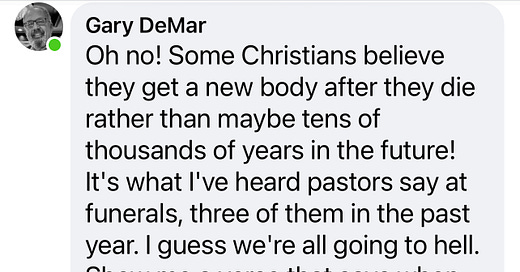
Easter Eschatology
When Christ declared on the cross, “It is finished!” he meant the atonement was forever over. But when he rose, he didn't declare, “It is finished!” Easter isn't over.
The Resurrection panel from the Isenheim Altarpiece, Matthias Grünewald (1515)
Dear friends and supporters:
This Sunday Christians observe Easter, the church’s great Holy Day commemorating our Lord’s resurrection. Why should that event be celebrated? The question seems almost irreverent, but it’s worth asking.
To many Christians historically, the answer is principally negative: Jesus Christ is no longer dead (thank God!) but is alive. But this is only half a right answer, and perhaps not even half.
The reason that this truncated answer has often been thought the entire answer is that for most of its life the Western church lost the full significance of that resurrection.
The Easter Community
The primitive church (first few decades after Christ’s ascension) was an Easter community. The early Christians reveled in the risen, ascended, and ruling Lord long before they grasped the theological significance of his death. Of course, they had a general sense of Christ died for man’s sins, but nothing like our understanding of that substitutionary atonement.
On the other hand, they were overjoyed by the living Lord, and that resurrection-generated Lordship is something they understood (Ac. 2:22–36; 3:11–16; 4:5–12; 5:27–32; 7:54–60; 9:1–9; 10:34–43). In fact, as Oscar Cullmann pointed out, the earliest creed in the church is Kyrios Christos: Jesus is Lord. The one who arose and ascended to assume David’s throne was formally installed as Lord of all things in heaven and on earth (Phil. 2:4–11). This the primitive church did understand.
The Retreat from Easter
Over time, however, as the Easter ardor of the primitive church cooled, and succeeding Christians grew historically distant from the historical reality of the resurrection, it was the interpretation of Christ’s atoning death that gained prominence, particularly as its benefits were communicated via a sacerdotal church (see “Beware Under-Realized Soteriologies”).
This concentration on Christ’s death to the relative neglect of his resurrection continued in the Western church up to the present, such that today when we pose the question: “How are we saved by Christ’s resurrection,” Christians might look at us quizzically. They understand how Christ death saves us — he bore our own sins in his own body on the cross (1 Pet. 2:24). But it’s not clear How Christ’s resurrection saves us, though the Bible plainly teaches that it does (Jn. 11:24–26; Rom. 4:25; 6:4; 1 Cor. 15:12–21; 1 Pet. 1:3).
You can read more about this problem in this book:
Get the book here.
Paul preached, in fact, that the resurrection should take precedence even over the death of Christ, which is the last thing that any true Christian anywhere would underemphasize:
Who is he who condemns? It is Christ who died, and furthermore [mallon, more, to a greater degree] is also risen, who is even at the right hand of God, who also makes intercession for us. (Rom. 8:34)
By Christ’s atoning death alone?
We rejoice in the hymn lyric, “It is enough that Jesus died and that he died for me”; but, strictly speaking, this is not true. If we asked ourselves on what grounds we can be saved, our answer might be, “Christ suffered the penalty from my sins on the cross, and all my sins are taken away; God will not judge me because he judged his Son in my place.” This is only a partial truth.
Paul makes very plain that we cannot be saved by Christ’s death alone:
And if Christ is not risen, then our preaching is empty and your faith is also empty…. And if Christ is not risen, your faith is futile; you are still in your sins! Then also those who have fallen asleep in Christ have perished. If in this life only we have hope in Christ, we are of all men the most pitiable. (1 Cor. 15:14–19)
Had Christ suffered on the cross for our sins but never risen, we cannot be saved. In fact, we would still be dead in our sins. To those of us who understand substitutionary atonement, this might come as a shock. Didn’t Christ suffer for all our sins on the cross? Yes. Wasn’t the cross sufficient to take away our sins? No.
The New World Order
Here’s why. While the crucifixion removed the penalty for sin, Christ himself bearing it, the resurrection overturns the entire sinful order. Though the crucifixion has glorious effects throughout all history and even eternity, the resurrection is a persevering eschatological fact. When Christ declared on the cross, “It is finished!” he meant the atonement was over. He died once for all (Rom. 6:10a; Heb. 9:11–28).
But when he rose, he did not declare, “It is finished!” Why? Because the resurrection isn’t finished. The resurrection is not only a past event; it’s also, and equally, an eschatological event.
If you had asked Paul when the final resurrection would be, he’d have responded, “It already started.” Jesus was the first fruits, the first of many (1 Cor. 15:20–23), all of the saints on the Final Day. The crucifixion was final and definitive. The resurrection is progressive and continuous. Not that Christ himself must die and rise again, but his rising from the dead is the first in a long, glorious, comprehensive cosmic process.
Cosmic sin
When Adam and Eve sinned, they not only elicited God‘s judgment on them as individuals. They invited an entire sinful cosmic order. All creation was cursed, and the age or eon itself became sinful. The first Adam created a new sinful world order (Rom. 5:12–19; 1 Cor. 2:8; 2 Cor. 4:4) . The problem with sin in the world isn’t simply that if man doesn’t trust Christ, God will eternally judge him. That ominous prospect is true enough.
In addition, however, the created order itself is weighed down by sin — man’s sin, not the sin of society or institutions, as Pelagius and liberals would have us believe, but man’s sin that afflicts every aspect of the created order.
When Christ rose, he instituted a new righteous age, a new redemptive order. He had suffered sin’s penalty on the cross, but he only finally defeated it when he rose. Why? Because death is the infallible mark of a sinful order (Gen. 2:17). His resurrection put to death the old order, though death in a still-sinful world still claims us and will only finally be obliterated in the final resurrection.
But that order itself was judged and broken at Easter. Christ is now ruling over a new cosmic righteous order. This is why Paul writes in Ephesians 1:21 that Christ is exalted
far above all principality and power and might and dominion, and every name that is named, not only in this age but also in that which is to come.
And in 1 Corinthians 14:9 he trumpets:
For to this end Christ died and rose and lived again, that He might be Lord of both the dead and the living.
Peter similarly declares:
There is also an antitype which now saves us — baptism (not the removal of the filth of the flesh, but the answer of a good conscience toward God), through the resurrection of Jesus Christ, who has gone into heaven and is at the right hand of God, angels and authorities and powers having been made subject to Him. (1 Pet. 3:21–22)
Lewis Smedes captures the unlimited earthly scope of this Easter eschatology:
Jesus Christ is not merely in history; he changed the historical situation …. He does it by overcoming, behind the scenes, the landlords of history who were leading it to ruin. Putting this in Paul‘s language, Jesus is not only the Savior of men, he is the Lord of “all things.”
Since Jesus Christ arose and ascended, we are in a new situation, living under a new authority, called to subject ourselves to the discipline of the new order and invited to the joy of men set free from slavery. History moves on, with Christ in control....
... Being “in Christ” means being part of a program as broad as the universe and as deep as life. The new creation is not merely the renewal of individuals, though this must be given its due…. The design of Christ’s new creation is far too grand, too inclusive to be restricted to what happens inside my soul. No nook or cranny of history is too small for its purpose, no cultural potential too large for its embrace. Being in Christ, we are part of a new movement by His grace, a movement rolling on toward the new heaven and new earth where all things are made right and where He is all in all.
The New Easter Order
This Easter eschatology is a reality in the individual Christian life. This is most striking in Romans 6. When were united to Jesus Christ by faith, we were united to his suffering of sin’s penalty on the cross, as well as his resurrection-crushing of the old sinful world. For this reason sin no longer has any reign over us. This doesn’t just mean we can have consistent victory over sin. It also means that we are victors over the cosmic sinful order. But we still sin, because sin has not been removed entirely from the cosmos, but sin is no longer our master. We live Easter eschatology lives.
But this Easter eschatological victory can’t be limited to the individual or even the church. When Christ rose to vanquish the entire sinful order, that includes all of life and culture. This is one of the messages of Ephesians 1:3, 10, 19–23. Jesus Christ is presently seated in heavenly places as a result of his resurrection. He is ruling and reigning, and we are reigning with him.
The resurrection victory extends to the entire cosmos. This means that we should work for and expect the gradual elimination of abortion; the reversal of “The Erotic Regime” and the reinstallation of a godly sexual order — one man for one woman for one lifetime; the dethroning of statism as the new idol and the restoration of self-government, church government and family government as the leading governments in society (see “Separation of Church and Statism”). And so on.
To argue for resurrection victory in the individual life and the church but not in society and culture is to advocate a truncated, emaciated view of Easter. Easter Eschatology is present everywhere sin is entrenched.
Conclusion
This Easter weekend let’s not commemorate merely on the single great event of the empty tomb, but also the continual Easter event of which our Lord‘s resurrection was the harbinger and first fruit. We can rejoice this Easter Sunday (and every Sunday; for the early church, Easter was every Sunday), that all areas of creation presently under the dominion of sin are being gradually redeemed, resurrected, by the power of the Spirit.
Easter is the great eschatological fact that should govern our entire lives.
Will you consider a tax-deductible donation to CCL via PayPal or Venmo? Or mail a check to CCL, Box 100, Coulterville, CA 95311. God uses you to keep us going — and expanding.
Personal
I’m gearing up for the Common Slaves Spring Conference, Saturday, April 17 at Lifespring Church in Crosby, Minnesota (Eric Anderson, pastor). The theme is “Christ is King: The World According to the Creator.” I’m addressing “The Nature of True Christianity in Light of Its Current Counterfeits” and “Creation Versus Gnosticism.” The other speaker will be my friend Dr. Ardel Caneday, co-pastor of Christ Bible Church in the Minneapolis area, where I’ll be preaching Sunday, April 18 on “The Greatness of the Church.”
To change things up a bit, next week I plan to release here an audio newsletter (I gather it’s called a podcast) on “Beware of Boldly Narrow Knowing,” addressing the problem of justifiably bold Christians whose intellectual narrowness blunts their effectiveness.
Thank you for your kindness, friendship, and support.
Yours for the Risen King,
Founder & President
Center for Cultural Leadership
Gaffin on the Resurrection
To delve into this topic more fully, read Richard B. Gaffin Jr.’s minor classic Resurrection and Redemption: A Study in Paul's Soteriology.
More great stuff:
The Center for Cultural Leadership site is here.
My Amazon author page (print and digital) is here.
You can find my sermons and lectures at my YouTube channel.
Sign up to get my blog updates here.
Here’s my Twitter feed.
If you want to get the free exclusive hard copy publication Christian Culture, please send me a Facebook private message.
The CCL phone number is 831-420-7230.
The mailing address is:
Center for Cultural Leadership
P.O Box 100
Coulterville, CA 95311










